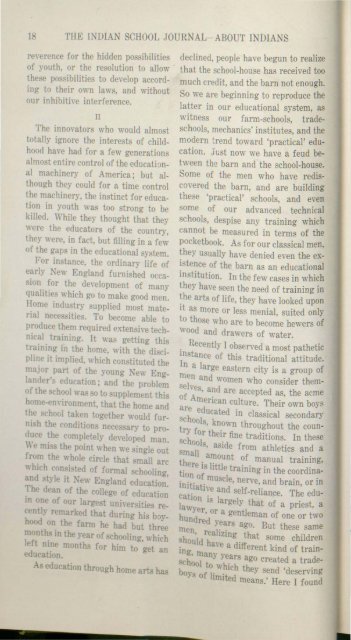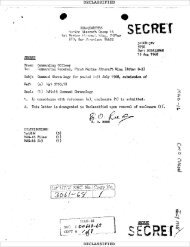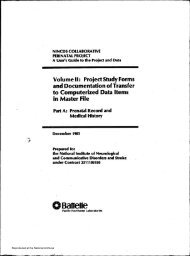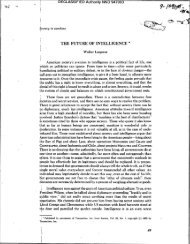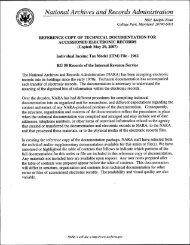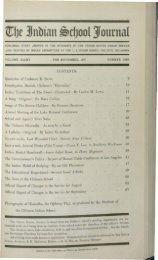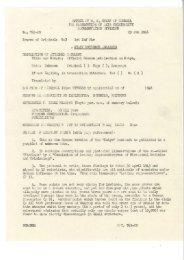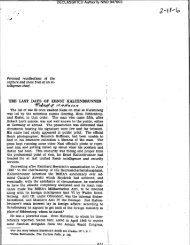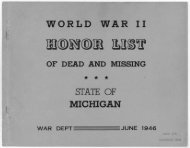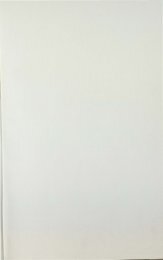the indian school journal - National Archives and Records ...
the indian school journal - National Archives and Records ...
the indian school journal - National Archives and Records ...
Create successful ePaper yourself
Turn your PDF publications into a flip-book with our unique Google optimized e-Paper software.
18 THE INDIAN SCHOOL .JOURNAL ABOUT INDIANS<br />
re\'erence for <strong>the</strong> hidden possibilities<br />
of youth, or <strong>the</strong> resolution to allow<br />
<strong>the</strong>,e pos,;ibilities to develop according<br />
to <strong>the</strong>ir own laws, <strong>and</strong> without<br />
our inhibiti\'e interference.<br />
II<br />
The inno\'ators who wou ld almost<br />
totally ignore <strong>the</strong> interests of childhood<br />
ha\'e had for a few generations<br />
almost entire control of <strong>the</strong> educational<br />
machinery of America; but although<br />
<strong>the</strong>y could for a time control<br />
<strong>the</strong> machinery, <strong>the</strong> instinct for education<br />
in youth was too strong to be<br />
killed. While <strong>the</strong>y thought that <strong>the</strong>y<br />
were thi:' educators of <strong>the</strong> country,<br />
<strong>the</strong>y were, in fact, but filling in a few<br />
of <strong>the</strong> g,lps in <strong>the</strong> educational system.<br />
For instance, <strong>the</strong> ordinary life of<br />
early Xew Engl<strong>and</strong> furnished occasion<br />
for <strong>the</strong> development of many<br />
qualitie,; which go to make good me~.<br />
Home industry supplied most material<br />
necessities. To become able to<br />
produce <strong>the</strong>m required extensi\'e technical<br />
trainmg. It was getting this<br />
training in <strong>the</strong> home, with <strong>the</strong> discipline<br />
it implied, which constituted <strong>the</strong><br />
major part of <strong>the</strong> young Xew Engl<strong>and</strong>er's<br />
education: <strong>and</strong> <strong>the</strong> problem<br />
of <strong>the</strong> <strong>school</strong> was so to supplement thi.<br />
home-ennronment, that <strong>the</strong> home <strong>and</strong><br />
<strong>the</strong> schaul taken toge<strong>the</strong>r would furnish<br />
<strong>the</strong> conditions neces"ary to produce<br />
<strong>the</strong> completely developed man.<br />
We mi'S <strong>the</strong> point when we single out<br />
from <strong>the</strong> whole circle that small arc<br />
whiel] consi,;ted of formal <strong>school</strong>ing,<br />
<strong>and</strong> style it .' ew Engl<strong>and</strong> education.<br />
The dean of <strong>the</strong> college of education<br />
in one of our largest unh·er.:ities recently<br />
remarked that during his b)yhood<br />
on <strong>the</strong> fann he had but three<br />
month .. in <strong>the</strong> year of <strong>school</strong>ing, which<br />
left nine months for him to get an<br />
education.<br />
As education through home arts has<br />
declined. people have begun to realize<br />
that <strong>the</strong> <strong>school</strong>-house has received too<br />
much credit, <strong>and</strong> <strong>the</strong> barn not enough.<br />
So we are beginning to reproduce <strong>the</strong><br />
latter in our educational system, as<br />
witness our farm-<strong>school</strong>s, trade<strong>school</strong>s,<br />
mechanics' institutes, <strong>and</strong> <strong>the</strong><br />
modern trend toward 'practical' ed u<br />
cation. Just now we have a feud between<br />
<strong>the</strong> barn <strong>and</strong> <strong>the</strong> <strong>school</strong>-house.<br />
Some of <strong>the</strong> men who have rediscovered<br />
<strong>the</strong> barn, <strong>and</strong> are building<br />
<strong>the</strong>se 'practical' <strong>school</strong>s, <strong>and</strong> even<br />
some of our advanced technical<br />
<strong>school</strong>s, despise any training which<br />
cannot be measured in terms of <strong>the</strong><br />
pocketbook. As for our classical men,<br />
<strong>the</strong>y usually have denied even <strong>the</strong> existence<br />
of <strong>the</strong> barn as an educational<br />
institution. In <strong>the</strong> few cases in which<br />
<strong>the</strong>y have seen <strong>the</strong> need of training in<br />
<strong>the</strong> arts of life, <strong>the</strong>y have looked upon<br />
it as more or less menial, suited only<br />
to those who are to become hewers of<br />
wood <strong>and</strong> drawers of water.<br />
. Recently I ob erved a most pa<strong>the</strong>tic<br />
mstance of this traditional attitude.<br />
In a large eastern city is a group of<br />
men <strong>and</strong> women who consider <strong>the</strong>mseh'es,<br />
<strong>and</strong> are accepted as, <strong>the</strong> acme<br />
of American culture. Their own boys<br />
are edUcated in classical secondary<br />
scho I<br />
a s, known throughout <strong>the</strong> country<br />
for <strong>the</strong>ir fine traditions. In <strong>the</strong>se<br />
<strong>school</strong>s, aside from athletics <strong>and</strong> a<br />
amount of manual training,<br />
s~all<br />
t ere is little training in <strong>the</strong> coordina<br />
~I~n of muscle, nerve, <strong>and</strong> brain or in<br />
Inlt t· ,<br />
Ia I\'e <strong>and</strong> self-reliance. The education<br />
is largely that of a priest, a<br />
la \\",.<br />
,er, or a gentleman of ODe or two<br />
hundred' ,<br />
~ ear, ago. But <strong>the</strong>se same<br />
men, realiZing that some children<br />
: hould have a different kind of train<br />
Ing, man\' "e<br />
h - .' ars ago created a tradeb:<br />
.~l to. w~ich <strong>the</strong>y send 'deserving<br />
). of hmlted means.' Here I found


